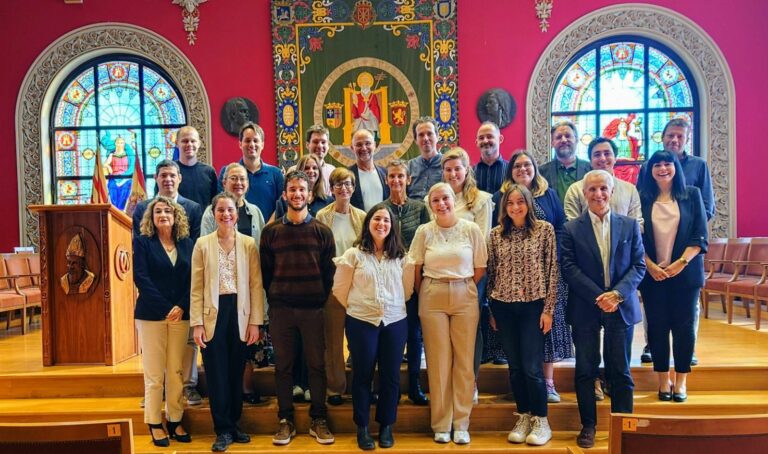We normally think of “crisis managers” as a select group of professionals to be deployed in moments of disruption. Their role is to protect communities from rare and dangerous events and to assist “administrators” in bouncing back after the crisis. But with increasing turbulence and the advent of “poly-crisis”, this sharp distinction between crisis management and “normal” public administration makes less and less sense. Public managers everywhere must develop a robust crisis governance mindset that embraces crisis and turbulence as opportunities for “building back better” through adaptation and innovation of core public sector functions.
Building on in-depth case studies from nine European countries and cross-cutting Qualitative Comparative Analysis, the Horizon Europe-sponsored ROBUST project identifies strategies and conditions for crisis responses that deliver public value in new ways while maintaining the core European values of democracy and the rule of law.
Presentation by Jacob Torfing
Lead: Jacob Torfing
Roskilde University
WP1 ensures timely implementation and coordination of the work plan and the delivery and dissemination of scientific outputs of international quality, including professional administrative and financial management of the project management of ethical issues, gender aspects, open science and data protection.
Lead: Jacob Torfing
Roskilde University
The main objective of WP2 is to construct theoretical and operational definitions of the key concepts in the project. The WP thereby lays the conceptual foundation for the project while creating the rudiments of a new robust governance mindset. To achieve this objective, the work package will:
Lead: Tiziana Capano
University of Turin
The objective of WP3 is to study examples of how multi-level governance can help or hinder robust responses to crisis and turbulence through documentary evidence of EU and national crisis responses. Results will be scrutinized in discussions with a group of relevant public and private decision-makers. The task will draw lessons for multi-level governance. To
achieve this objective, the work package will:
Lead: Tiina Randma-Liiv
Tallin University of Technology
The objective of WP4 is to conceptualize, operationalize and study the use of hybridization in the face of crisis and turbulence. The work package will study examples of hybridization that both illustrate productive synergies between different tools of governance, democracy, and law, and deal with potential trade-offs between legitimacy (democratic principle), efficiency (governance principle), and legality (juridical principle). Results will be scrutinized in discussions with a group of relevant public and private decision-makers. To achieve this objective, the work package will conduct the following tasks:
Lead: Wouter van Dooren
University of Antwerp
The objective of the work package is to conceptualize and operationalize societal intelligence. We will study the institutional interfaces at EU and national level between experts and policymakers (scientific advisory committees, advisory reports, etc.), between experts and the public (science communication in various forms), and between policymakers and the public (communication campaigns, press meetings, media coverage, etc.) and they may function as “circuit breaker” mechanisms, ensuring that systemic risks do not spill over. The final analysis will draw lessons on strategies for strengthening institutions for societal intelligence. To achieve this objective, the work package will conduct:
Lead: Scott Douglas
University of Utrecht
This work package explores the messy reality of how robust crisis governance emerges (or fails to) in practice by examining how the response to the COVID-19 crisis played out in ‘networked localities’ across Europe . This work package moves from the orderly world of systems and papers to the messy realities of turbulence, responses, and felt results, allowing us to study the interaction between multi-level governance, hybrid governance, and societal learning and how these factors impact robustness. To this end, the project will conduct in-depth case studies of 18 localities in nine different EU member states, selected to represent the diversity of European lifeworlds. To achieve this objective, the work package will:
Lead: Scott Douglas
University of Utrecht
This final analytical work uses the analytical results and data from WP2-6 to identify how different strategies in multilevel governance, hybrid governance, and societal learning do (or do not) reinforce each other in producing robust governance. In this analytical process, the project explicitly allows for identifying multiple configurations for ensuring robustness, rather than vainly seeking ‘one best way’. Moreover, WP7 will critically examine how context-dependent benign or malign combinations are, explicitly focusing on the importance of national context, which can be detrimental to ignore when drafting EU-wide crisis response policies. The configurations identified will be relevance-tested in dialogue with members of the learning hub (WP8). To achieve this objective, the work package will:
Lead: Rasmus Øjvind Nielsen
Roskilde University
This work package establishes an interactive Learning Hub which facilitates two-way exchange with the stakeholder community and provides an online repository of learning materials. The two-way exchange in the Learning Hub informs and guides the project and, simultaneously, provides the mutual learning opportunities needed to achieve a paradigm shift among policymakers and practitioners.
Lead: Brigid Transon
European Public Health Alliance
The aim of WP9 is to develop an inclusive outreach program in order to maximize the impact of the project through effective knowledge exchange and communication with a wide range of relevant audiences and beyond. Communication and dissemination activities will use targeted and tailored channels that cover the spectrum from personal and traditional to digital and social media.

© 2023 All rights reserved
Made with ❤ with Elementor